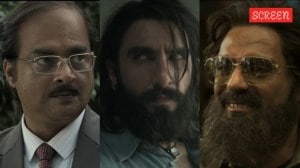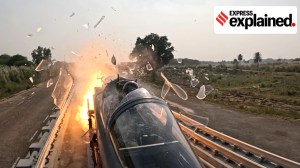Montague and Capulet as Shiite and Sunni
An adaptation of Shakespeares tragic romance Romeo and Juliet reflects the trauma of Iraqis over the last nine years
Tim Arango
It is not poison or a dagger that takes the lives of the young lovers,but a suicide bomb. The Montagues and Capulets are divided not just by family,but also by religious sect. And the dialogue in the Iraqi adaptation of Romeo and Juliet is sprinkled with references to Blackwater,Iranians and the US reconstruction effort.
After a recent performance at Baghdads National Theatre,the audience was buzzing over the return of serious art to the Iraqi capital. Shakespeares classic was a lively rendering of their own lives over the last nine years. It was about our reality,the killing that happened between the Sunnis and Shias, said Senan Saadi,a university student.
The killing,of course,still happens. The morning after the show,explosions were heard in Baghdad. That day,attacks around the country left nearly three dozen people dead. By then,the cast of the play was preparing to leave for the World Shakespeare Festival in Stratford-upon-Avon,William Shakespeares birthplace.
Romeo and Juliet in Baghdad is part of the cultural programme linked with the coming London Olympics. Its story line of a doomed cross-sectarian love affair manages to touch on nearly every element of the recent collective Iraqi experience. That it garnered many laughsespecially over the buffoonish al-Qaida character in an explosives-laden vestand plenty of tears,too,is perhaps a sign that Iraqi society is beginning to reconcile with the trauma of the war.
Romeo,he doesnt see Juliet for nine years, explained Monadhil Daood,the famous Iraqi actor and playwright directing the play who spent two years writing the script. At their first meeting they talk about the conflict between Sunni and Shia.
Sunni and Shia are not mentioned explicitly but are symbolised in ways that are clearly recognisable to an Iraqi audience. Capulet,Juliets father,is denoted as a Sunni by his red-and-white checkered keffiyeh. Romeos father,Montague,wears a black-and-white scarf more commonly worn by Shiites. My message is that love is better than the conflict between the families, Daood said.
Knit throughout are little details of life in Iraq. A US general makes a cameo. Staccato machine-gun fire provides background noise.
Performances of Shakespeare plays were sometimes performed under Saddam Husseins government. You could always get the classics past censors, said Deborah Shaw,the director of the Shakespeare festival in England and Daoods wife. Dictators,Shaw explained allowed Shakespeare plays because,they are about legitimacy of power,how we should live together,justice.
Arab dictators also sometimes gravitated to Shakespeares works for anti-Semitic purposes. For instance,The Merchant of Venice,with its jewish villain,was a staple of school curriculums under Hussein,she said. For Shaw,the play raised a question about Iraq that has surely crossed the minds of many Iraqi women Where are the Romeos? she said. Weve had enough of gun-toting,dim young men.
Its a portrayal of the Iraqi reality and a message to the world, said Ahmed Moneka,24,who plays Romeo. Its written in a way that has touched the root of the Iraqi reality. Speaking of the cast,he said: Weve all been through these crises and sectarian conflicts. There is a lot of ignorance here.
Sarwa Malik,23,plays Juliet,who is a Sunni. Malik is Shiite and Kurdish,and drew on her own experience of forbidden,cross-sectarian love for her character. Three years ago,while in college,she fell in love with a young Sunni man. She came from money and he did not. My family was always saying,Dont be with this guy, she recalled.
Today they are married.
There are a lot of men and women,girls and boys,who were in love and were unable to be together, she said. If they are really in love,they have to break these barriers.
- 01
- 02
- 03
- 04
- 05































